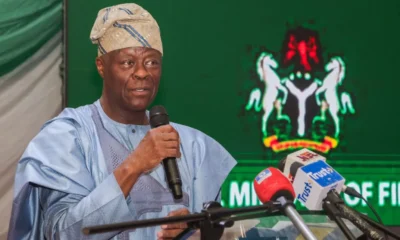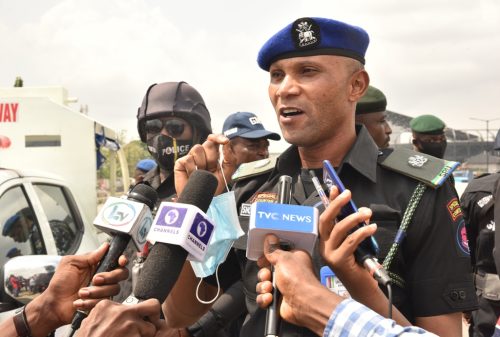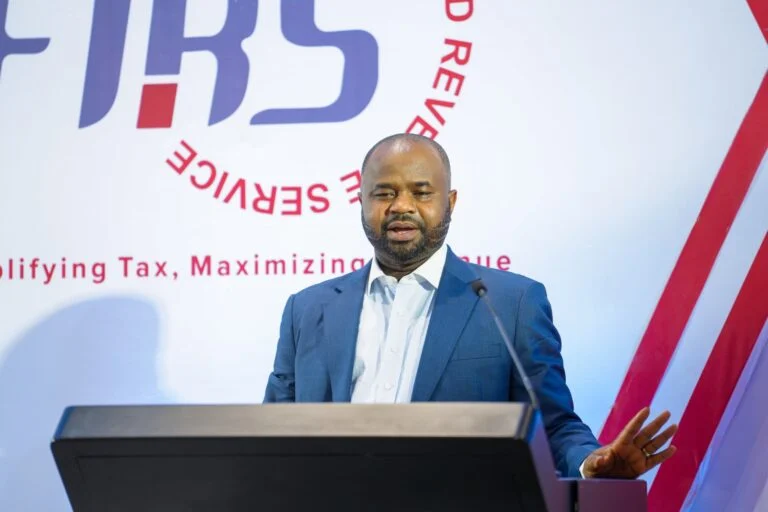The Lagos State Environmental and Special Offences Enforcement Unit {Taskforce} has said that Motorists who have developed the habit and passion for driving against traffic (One-way) should be bold and courageous enough to face the Mobile Court.
Speaking at the Agency’s Headquarters today at Safety Arena, Bolade Oshodi, Lagos, the Chairman of the Agency, CSP Shola Jejeloye in a swift reaction to an online video of one Mr. George Udeze on his Facebook page who alleged that Taskforce had impounded his White Honda Accord with registration number 03-566 DLA about 7 months ago.
The Chairman said that there was no iota of truth in the report of the video, he said that the man in question’s vehicle was impounded for driving against traffic at Allen Avenue inward Opebi Road. He narrated that the man haven discovered that there was traffic around the area, faced oncoming vehicles in their thousands creating a serious traffic bottleneck.
The Chairman further stated that all efforts by Taskforce Officials led by a Senior Police Officer to persuade him to roll down his vehicle window glass for possible engagement on why he had to do that, proved abortive, but rather than being civil in his approach and conduct, he started making several phone calls and kept them waiting for hours, mobilizing the general public against the agency’s officials and threatened to deal with them, having known the degree and the magnitude of the offence committed which attracts forfeiture of the vehicle to the State Government.
CSP Jejeloye stated that Mr. Udeze in his ungentlemanly posture stated in the report that he was afraid when he saw his Country Policemen controlling traffic for ease of his own mobility and doing their lawful duties, but rather than encourage them for the patriotic act due to traffic pressure on the road, he chose to see them in his own imagination as nothing but kidnappers’ when the likes of him had blocked the free flow of traffic around the area by their selfish conduct.
‘’Let me emphasise here that you don’t need to be afraid of Policemen if you are doing the right things, after all if your security is threatened you will still run to Police for the safety of lives and property’’
Consequently, the offender also alleged in the video that his vehicle had been confiscated for the past 7months. The Chairman responded that “Our duty is to effect the arrest of the offender(s}, but we do not have the power to issue fines and penalties, it is a legal issue which has to be decided by a court of competent jurisdiction”.
All efforts put in place by the Agency to let offenders bring their particulars forward to enable the Agency to charge them to court always proved abortive.
Some of them resort to lobbying the Agency Officials through several influences, cutting corners and monetary inducement to escape justice, and if it fails, they resort to blackmailing, needless media war and propaganda against the Agency’s officials; accusing them of extortions, assault, bribery and corruption.
“The era of settling traffic offences (one-way) out of court is gone. If you are courageous and hard enough to drive against traffic, you must also be bold enough to face the Court for its consequences”, Jejeloye stated.
He emphasised that ‘‘traffic bottlenecks popularly known as (Go slow and Hold-ups) are not natural, it is not created by God, but a product of a minute recklessness and two minutes impatience on the road.’’ The Chairman opined.
The Taskforce Chairman admonished all recalcitrant offenders that traffic offence is not a criminal offence, they should keep faith with the country’s Judicial system and summon the courage to submit self for the prosecution at the Court for the offence committed, it is better and cheaper for them to face the reality of the offence they committed, rather than being evasive or working assiduously to settle out of court in order to sweep the issue under the carpet which is not acceptable to us. Nigerians are no fools.
In a related development, the Chairman stated that the Agency in its drive to rid the State of the menace of Okada riders on Its highways had impounded over 129 Motorcycles over the weekend. He further said that the Agency will not condone any act of indiscipline and lawlessness from any recalcitrant okada operators on the restricted route.
Meanwhile, the Agency in its drive to maintain a crime-free festive season had again busted a crime syndicate who specialise in extorting unsuspecting members of the public and arresting Okada riders under the guise of being a security operative attached to Lagos State Taskforce. One of the suspects, Emmanuel Okoh who operates between Ajah and Oshodi area of the state, was arrested kitted in Mobile Police uniform with a tactical jacket at Oshodi during the Agency’s raid of black spots and enforcement for compliance in the area as part of the efforts of the Agency to achieve zero tolerance to criminal activities during the yuletide period. All the suspects will be charged to court.
Jejeloye advised members of the public to be vigilant, report any suspicious activities around them to the Agency and help the Agency in her drive to fish out fake policemen parading themselves as Taskforce officials.
He enjoined Lagosians to support the Agency in her efforts to instil discipline and achieve the State’s vision of zero tolerance for driving against traffic and other related offences. The task force was created to maintain law, order and sanity where there is none. Enforcement of One-way traffic laws is not a tea party as the offender would do anything humanly possible to escape justice, and in the process, the offender can kill, maim, cause serious injury to innocent members of the public in his bid to escape from the scene. Driving against traffic is tantamount to attempted murder as unsuspecting road users may not notice the vehicle coming from the opposite direction, he said.

 BIG STORY3 days ago
BIG STORY3 days ago
 BIG STORY5 days ago
BIG STORY5 days ago
 BIG STORY3 days ago
BIG STORY3 days ago
 BIG STORY5 days ago
BIG STORY5 days ago
 BIG STORY3 days ago
BIG STORY3 days ago
 BIG STORY3 days ago
BIG STORY3 days ago
 BIG STORY5 days ago
BIG STORY5 days ago
 BIG STORY4 days ago
BIG STORY4 days ago























